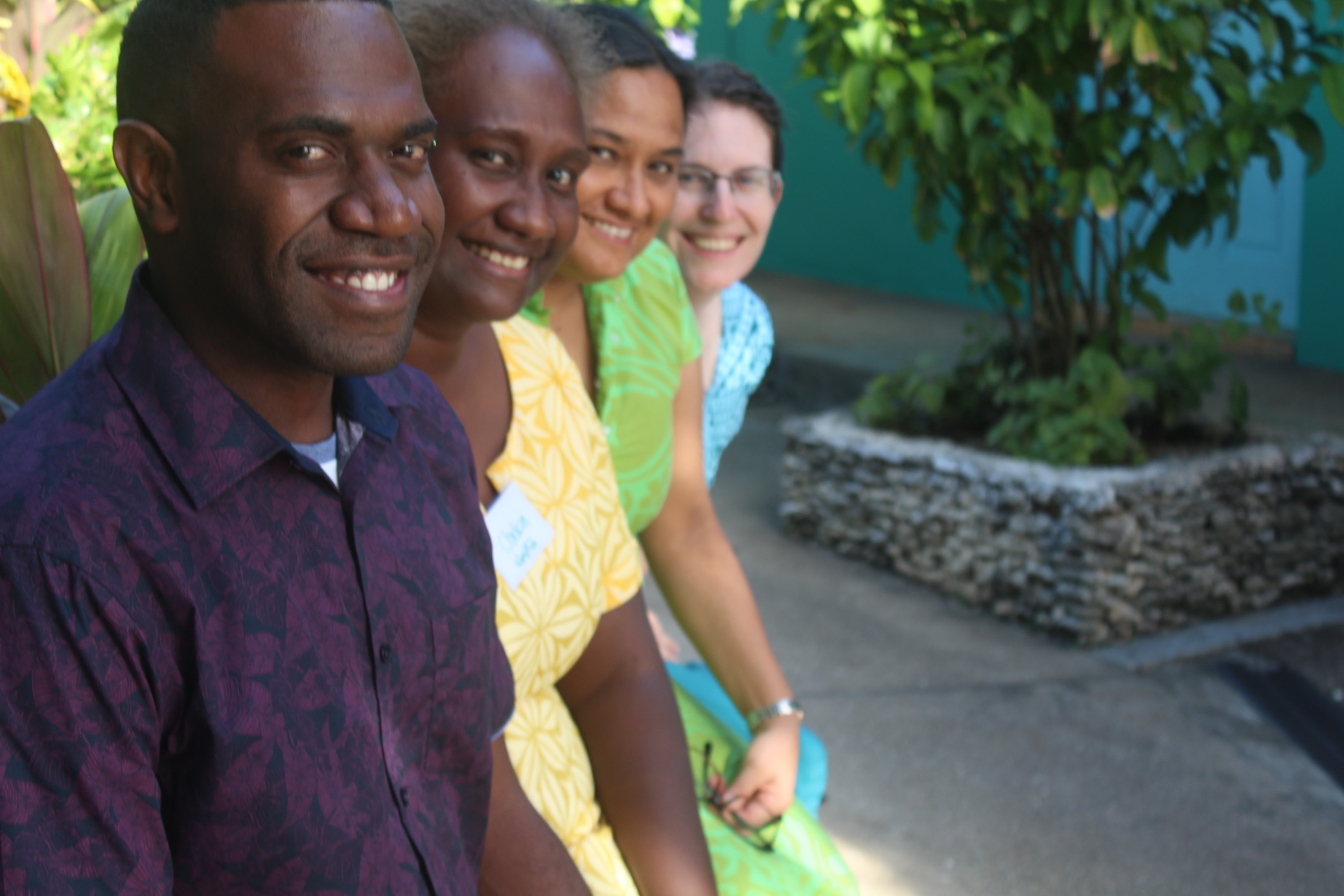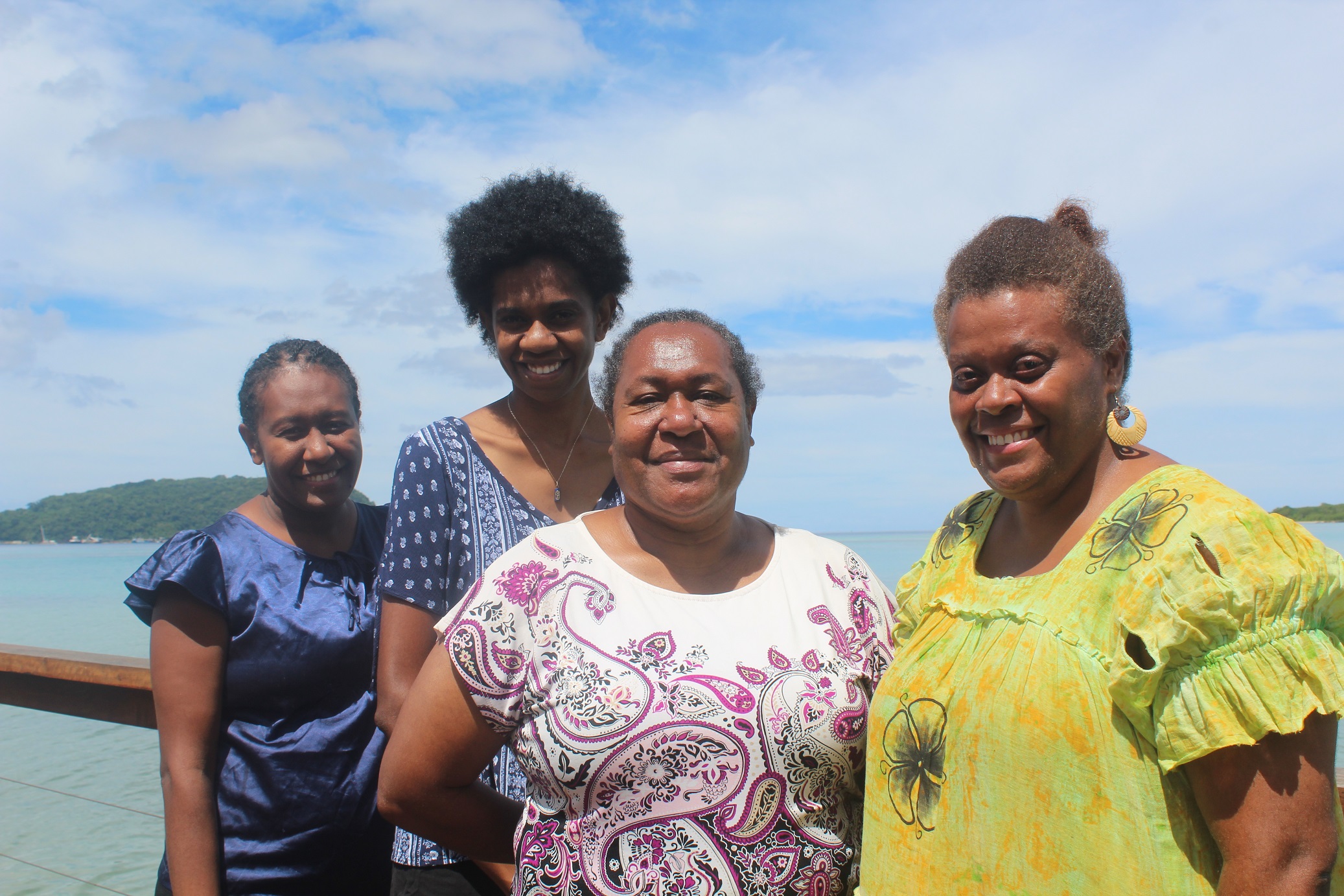With two thirds of the population living within one kilometer of the coast, coastal fisheries are a critical resource for food security, nutrition, livelihoods and cultural practice or kastom in Vanuatu. Last year, the Vanuatu Department of Fisheries launched the “Vanuatu National Roadmap for Coastal Fisheries: 2019‒2030”. Vanuatu’s roadmap is comprehensive, aligning with the Melanesia Spearhead Group’s roadmap for inshore fisheries, as well as other regional (e.g. New Song) and global (e.g. FAO Guidelines for Securing Small-Scale Fisheries, Sustainable Development Goal 14 on Oceans) commitments and guidelines.
There are six principles to guide the implementation of Vanuatu’s roadmap – featured prominently, the first principle states how important it is to “recognize women’s contribution to coastal fisheries and promote more inclusive fisheries management and livelihoods.”

Gender trainers Cedric Paniel (OXFAM), Chelcia Gomese (WorldFish), Sangeeta Mangubhai (WCS), Danika Kleiber (JCU/WorldFish) © WorldFish
However, fisheries managers and practitioners do not have formal training and therefore lack the knowledge and skills needed to integrate gender into their work. In response, the Vanuatu Department of Fisheries hosted a training designed to increase and strengthen its capacity for integrating gender into fisheries and aquaculture work in Vanuatu.
Over two days, representatives from government, environmental NGOs and development organisations came together to share knowledge and experiences on gender integration into projects, programs and institutions. The training was specifically designed to:
1) Increase and strengthen capacity for government and NGOs to integrate gender into aquaculture, fisheries, environment and broader natural resource use and management; and
2) Develop clear pathways for gender integration into management and monitoring.
The materials for the training were co-developed by the Pathways Project in partnership with the Vanuatu team, the James Cook University ARC Centre of Excellence for Coral Reef Studies, WorldFish Solomon Islands, and the Wildlife Conservation Society’s (WCS) Fiji Country Program.
What was unique about the training was there were no Powerpoint presentations, no formal classroom teaching – instead activities were designed to enable participants to reflect on their own experiences, and consider how society shapes and influences ideas around gender roles and relationships. The training was highly interactive, providing time to reflect on the difference between sex and gender, and how gender norms can negatively influence the lives and relationships of men and women.

Participants at the gender in fisheries training in Port Vila, Vanuatu - copyright to WorldFish
Gender panelists (left to right): Julia Marango (CARE), Celine Bareus (Department of Women’s Affairs), Betty Zinner-Toa (UN Women), Jill Makikon (OXFAM) © WorldFish
Together, the participants explored the barriers different people in a community experience when they are engaging in participatory management decisions, and they gained new gender sensitive facilitation techniques. A panel of experts from UN Women, OXFAM, CARE and the Department of Women’s Affairs shared approaches and tools they found effective to progress gender equality in Vanuatu. The hope is that the approaches developed by these gender and development organisations, and the lessons they have learned, can openly be shared with the Vanuatu Department of Fisheries to better implement the National Roadmap for Coastal Fisheries.
Chelcia Gomese a Senior Research Analyst at WorldFish in Solomon Islands explains, “one of the highlights of the training was the opportunity to work and learn from with Cedric Paniel at OXFAM who is doing some leading and innovative work on gender in Vanuatu. It is rare for me to meet a male who is as passionate about gender as I am. I hope to bring what I have learned this week back to the work that will continue to do in Solomon Islands.”
This work is part of Dr Sangeeta Mangubhai’s Pew Marine Conservation Fellowship which is looking at how to better mainstream gender and human rights-based approaches into small-scale fisheries in Melanesia.